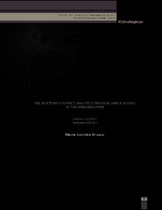| dc.contributor.author | Bruzco, María Lourdes | |
| dc.coverage.spatial | Seccional Medellín | spa |
| dc.date.accessioned | 2021-01-27T12:39:40Z | |
| dc.date.available | 2021-01-27T12:39:40Z | |
| dc.date.issued | 2012 | |
| dc.identifier.issn | 1794-8347 | |
| dc.identifier.uri | http://hdl.handle.net/20.500.11912/7646 | |
| dc.description | p. 39 - 49 | spa |
| dc.description.abstract | El efecto mariposa está referido a cómo pequeñas variaciones en las condiciones iniciales de un estudio inciden considerablemente en los resultados esperados. Tesis sostenida en las evidencias empíricas de Lorenz (1917-2008), en ambientes caóticos, siendo análogos a los procesos dinámicos que se desarrollan en el interior de las organizaciones, con connotaciones estratégicas. Se planteó interpretar las implicaciones estratégicas del efecto mariposa en el contexto organizacional, seleccionando la perspectiva cualitativa, paradigma interpretativo, revisando y analizando datos secundarios y usando el método hermenéutico. Se reconocieron las contribuciones de Lorenz (1963) en Geofísica, Cornejo (2004), Gleick (1987), Prigogine (1993), y Etkin (2009), Morín (2007), Nonaka y Takeuchi (1999), Schvarstein (1998), y Bruzco (2010), entre otros. Se concluye sobre la existencia de efectos mariposas en las organizaciones, así como atractores que vienen a generar un punto de quiebre entre sistemas estáticos y caóticos favoreciendo la emergencia de nuevos paradigmas, reconociendo lo complejo de la situación. | spa |
| dc.description.abstract | Butterfly effect is referred to something like small variations in the previous conditions of any study which impinge on the expected results. This thesis is sustained on the empirical evidences of Lorenz (1917-2000), in chaotic environments, being analogical to the dynamic processes developed in organizations with strategical connotations. To understand the strategic implications of this effect on an organizational
context, the qualitative perspective was chosen, as well as the revision of the interpretative paradigm reviewing and analyzing secondary datum and by using the hermeneutic method. Contributions by Lorenz (1963) in Geophysics, y Cornejo (2004), Gleick (1987), Prigogine (1993), Etkin (2009), Morin (2007), Nonak y Takenchi (1999), Schvairstein (1998) y Bruzco (2010), among others were recognized. In conclusion, this effect can be noted in organizations, as well as attractors which bring a break point between static and chaotic systems favoring the arising of new paradigms, recognizing the complexity of the situation. | spa |
| dc.format.mimetype | application/pdf | |
| dc.language.iso | spa | |
| dc.publisher | Universidad Pontificia Bolivariana | spa |
| dc.relation.ispartof | Revista Ciencias Estratégicas | spa |
| dc.rights | Attribution-NonCommercial-NoDerivatives 4.0 International | * |
| dc.rights.uri | http://creativecommons.org/licenses/by-nc-nd/4.0/ | * |
| dc.subject | Condiciones iniciales | spa |
| dc.subject | Atractores | spa |
| dc.subject | Sistemas caóticos | spa |
| dc.subject | Previous conditions | spa |
| dc.subject | Attractors | spa |
| dc.subject | Chaotic systems | spa |
| dc.title | El efecto mariposa y sus implicaciones estratégicas en el contexto organizacional | spa |
| dc.title.alternative | The butterfly effect and its strategic implications in the organization | spa |
| dc.type | article | spa |
| dc.rights.accessRights | openAccess | spa |
| dc.type.hasVersion | publishedVersion | spa |
| dc.description.sectional | Medellín | spa |
| dc.identifier.instname | instname:Universidad Pontificia Bolivariana | spa |
| dc.identifier.reponame | reponame:Repositorio Institucional de la Universidad Pontificia Bolivariana | spa |
| dc.identifier.repourl | repourl:https://repository.unab.edu.co/ | |


